To locals, he was simply known as “The Captain.” Unfortunately overshadowed by two guys named Wayne Gretzky and Mario Lemieux over most of his career, Steve Yzerman finally got the respect he deserved in 1997 when he finally led the Detroit Red Wings to that ever-elusive Stanley Cup, a drought of 42 years had ended. The Captain became a legend.
Early Life of Steve Yzerman
Yzerman was born in Cranbrook, British Columbia. He began skating at 3 years old, but was still two years too young to play organized hockey with his older brother Mike. At 5 years old, Yzerman began playing organized hockey, but really couldn’t skate all that well. In fact, his first goal was scored because he had fallen down in front of the opponents net and an opposing defenseman deflected the puck off a teammate. Since Yzerman was the last to touch the puck, he was given credit for the goal. This was certainly not a beginning befitting a legendary career.
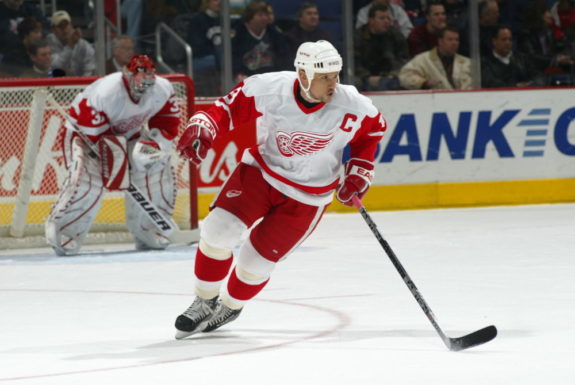
Yzerman played many sports as a child, but at 10 years old and after moving to Nepean, Ontario, a suburb of Ottawa, he would begin to focus most of his time on hockey. His team would win a peewee title at age 12. By age 14, Yzerman began playing for the Nepean Raiders, a Junior A Tier 2 team in the Central Junior Hockey League (CJHL), which had players anywhere up to 20 years old. He would go on to win two trophies that year as the league’s Rookie of the Year and Outstanding Midget in the League, and would also be named a first team All-Star center.
In 1981, at the age of 16, Yzerman was drafted by the Peterborough Petes of the Ontario Hockey League (OHL). He would go on to score 155 points in 114 games over two seasons with Peterborough. While his numbers were hardly “earth shattering” for a prospect at the time, he had demonstrated the two-way play that would become a staple of his game later in his NHL career.
Yzerman Enters the NHL
During 1983, when Yzerman became eligible for the NHL Draft, Detroit was not known as “Hockey Town.” In fact, the arena was typically three-quarters empty and selling tickets was extremely difficult. The Red Wings had not been a very successful team, only making the playoffs twice in the previous 17 years and called “The Dead Things,” by many in the area. New ownership had purchased the team the previous summer, Mike and Marian Ilitch of Little Caesars’ Pizza fame and the team was clearly rebuilding. The team’s pick in 1983 would be the first step to returning the team to respectability.
Yzerman was not number one on the team’s desire list for the draft, that designation would fall to Pat LaFontaine, another center who had happened to be born and bred in the city of Detroit, something the team thought would help sell tickets. However, with the 3rd pick in the draft, LaFontaine was selected by the New York Islanders, one spot before the Red Wings would pick. With LaFontaine gone, the Red Wings would select Steve Yzerman 4th overall.
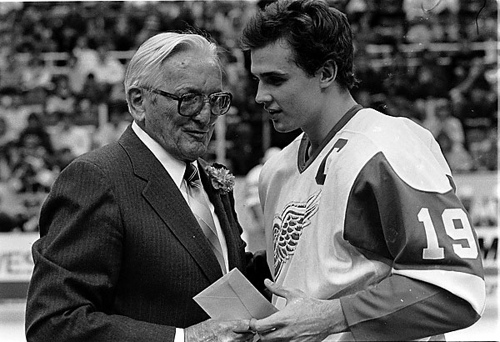
Yzerman made his NHL debut on October 5, 1983. The team lost to the Winnipeg Jets, however, Yzerman had a successful game scoring a goal and an assist. He would go on to score 39 goals and 87 points in his first year earning all rookie team honors, but coming second in voting for the Calder Trophy for Rookie of the Year to Tom Barrasso.
The next couple of seasons would be a roller-coaster ride for Yzerman. He would suffer his first severe injury during the 1985-86 season, a broken collarbone that would limit him to 59 games. However, during the following season (1986-87), Yzerman would receive the honor of being named the youngest captain in the history of the franchise at 21 years old and led the team to the Campbell Conference Final, only to lose to the eventual Stanley Cup champions, the Edmonton Oilers.
Yzerman’s Big Years
The next six seasons in Detroit would see amazing individual success for Yzerman, but little success for the team. From the 1987-88 season through the 1992-93 season, Yzerman would score more than 100 points every season, including career highs of 65 goals and 155 points during the 1988-89 season. He would accumulate an amazing 331 goals and 732 points in 466 games during this time.
The Red Wings would only make it past the first round of the playoffs once during this period. Little did the fans know at the time, however, many of the players the organization drafted or acquired during this time, Sergei Fedorov, Nicklas Lidstrom, Vladimir Konstantinov, Dino Ciccarelli and Ray Sheppard would go on to form the nucleus that would give this team the success it had been seeking for years.
In 1993, the Red Wings hired legendary coach Scotty Bowman. Bowman had won 7 Stanley Cups, 6 of them as a coach. The organization hoped that Bowman’s experience and Yzerman’s leadership and determination would combine for a winning result. Unfortunately, it would not begin on a positive note.
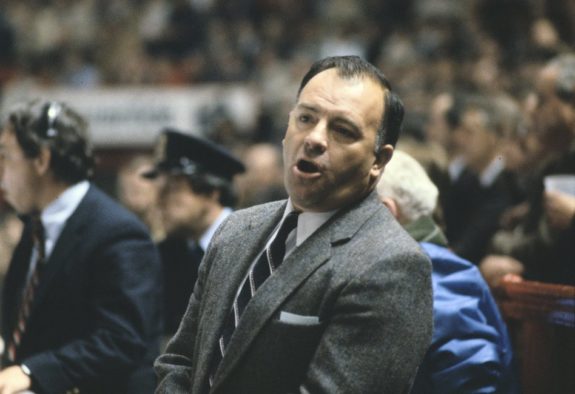
On October 21, 1993, Yzerman was hit from behind by Thomas Steen and crashed into the boards. A herniated disk would cause Yzerman to miss the next 26 games and major surgery to repair the disk would worry Yzerman for the first time. He knew his determination would get him back from the injury, but he wondered whether he would be the same player upon his return.
Yzerman’s dedication and extreme tolerance for pain would allow him to get back on the ice 2 months before many thought he would. He would go on to have a good season, scoring 82 points in 58 games, helping the Red Wings lead the league in scoring. Unfortunately, the Red Wings would be upset in the first round of the playoffs by the San Jose Sharks, a team that on paper was vastly inferior to the Wings.
Yzerman’s NHL Career Continues
During the offseason, Yzerman would need a second surgery for his neck and back pain that plagued him all season, a result of the hit by Steen. He would sit and wait out the trade rumors and rehabilitate over the summer, hoping again that he could come back the same player. He would not be the same player the next season, however, it was not a result of his injury or subsequent rehabilitation.
Bowman was also busy during the offseason. He was looking to create a new game plan for the upcoming season. Associate coach Barry Smith had returned from a coaching stint in Sweden, suggesting a defensive checking system he discovered while there called the “left wing lock.” It was a basic system that consisted of one forward, on the left side of the rink, staying back and helping out the defenders while trying to prevent an attack by the opposition.
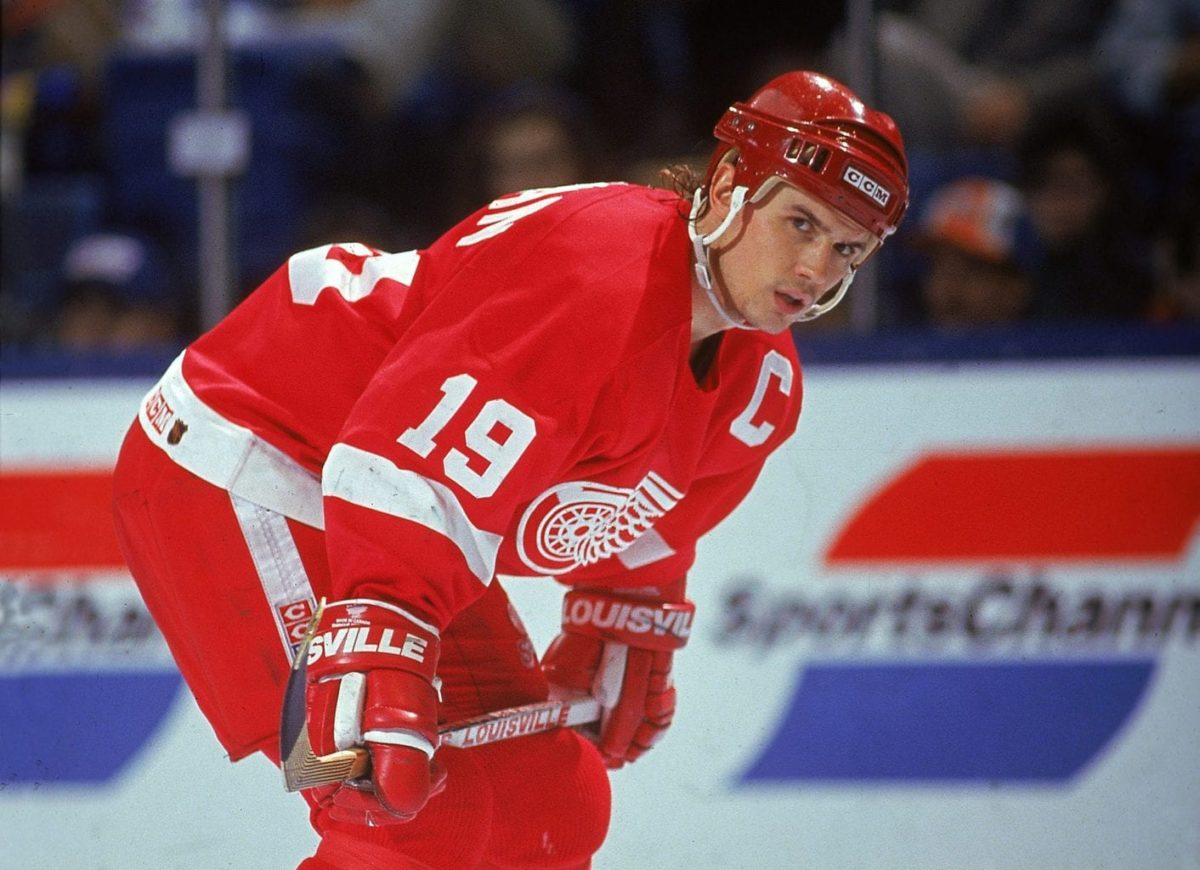
When Yzerman arrived at camp, he realized that to buy into this system would mean sacrificing personal statistics for the good of the team. Always a team first player, he had no problem doing this as his goal was to win the Stanley Cup, not earn personal accolades for his statistics. Yzerman dedicated himself to learning this system. His teammates would see their captain believe in it and they would as well.
The 1994-95 season would not begin as scheduled. Fueled by rising players salaries, many teams were struggling financially. Owners and players could not agree on a new contract. As a result, the owners locked out the players until the two sides finally came to an agreement. The season began on January 20th, 1995, 103 days from the scheduled start.
The lockout didn’t seem to affect the Red Wings at all. They stormed out of the gate on fire, armed with a new “defense first” style that the captain bought into, and the rest of the team followed. They would be awarded the Presidents’ Trophy as the top team in the regular season with a record of 33-11-4. The team would then storm through the first three rounds of the playoffs beating the Dallas Stars, San Jose Sharks and Chicago Blackhawks in five, four and five games, respectively. For the first time since 1966, the Red Wings were going to the Stanley Cup finals.
Unfortunately, Detroit would be swept by the New Jersey Devils. While Yzerman played well, he was hindered by a knee injury suffered in the second round against the Sharks and would not be at the top of his game. Once again, Yzerman and the Red Wings would go home disappointed.
Another Difficult Offseason
That summer would be a difficult one for Yzerman. While it wasn’t the first time he had been involved in trade rumors, this was the first time in several seasons he would be starting the year off completely healthy. The Ottawa Senators, from his hometown, were actively looking to acquire Yzerman. To the best of his ability, he just ignored the rumors and went about his business preparing for the upcoming season.
When the season began in October, Yzerman was still a Red Wing.
1995-1996 would see more great regular season success for the Red Wings, and personal success for Yzerman. The Wings would destroy team after team on the way to a record-breaking 62 win season, outscoring the opposition 325 to 181, and a second straight Presidents’ Trophy. Yzerman would score 95 points (36 goals and 59 assists), including his 500th career goal.
The playoffs would be more difficult. Despite outscoring the Winnipeg Jets 20-10, it would take the Red Wings 6 games to advance. The second round would be even tougher with the St. Louis Blues, led by Wayne Gretzky and Brett Hull, pushing the Wings to Game 7. What would happen in Game 7 would be one of the biggest moments in Yzerman’s career. The score would remain 0-0 through the first overtime. Within the first minute of the second overtime, Yzerman would steal the puck from Gretzky at center ice, skate past the blue line and launch a rocket of a shot past Blues goaltender Jon Casey. The Wings were going to the conference finals once again. They would face off against the Colorado Avalanche.
It was a nasty, hard-fought, bloody series. The Avalanche would storm into Detroit and take the first two games from the Wings. The teams would split the next two in Colorado giving the Avalanche a 3-1 series lead. Detroit would fight back with a 5-2 victory in game 5 but game 6 would not go as well for the Red Wings. In a game that would ignite a heated rivalry between the two teams for years to come, the players battled and even the coaches would argue across the benches.
The event that pushed the rivalry over the top would be the infamous check to the back of Kris Draper by Claude Lemieux of the Avalanche. The hit would send Draper face first into the boards causing several lacerations and a broken jaw. Even with revenge on their minds, the Red Wings could not win the game and the Avalanche would go on to win the Stanley Cup that season. Another disappointing end to a season for Yzerman and the city of Detroit.
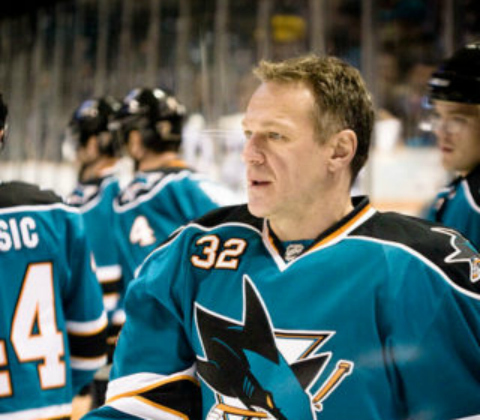
During the offseason, Yzerman would play for Team Canada during the World Cup of Hockey (replacing the Canada Cup). While Canada would lose to Team USA in the best of three final series, Yzerman would play with Brendan Shanahan for the first time and was very impressed with what he brought to the team, on and off the ice.
A Dream Comes True
The 1996-97 season would be different, at least that is what the team and the city hoped once again. In a move that would prove to be a huge step towards avoiding another disappointment, the Red Wings would acquire Shanahan at the start of the season from the Hartford Whalers for Keith Primeau and Paul Coffey.
The Red Wings would play well during the regular season finishing 38-26-18, however, they hadn’t dominated as in the past. The team took everything in stride that year and finally realized that it was more important to be dominant in the playoffs, rather than the regular season. That year would also see more personal success for Yzerman, playing in his 1,000th career game.
You may also like:
- Detroit Red Wings’ Salary Cap Mirage
- Detroit Red Wings’ 2023-24 Final Grades: Forwards
- How Much Did the Red Wings Improve in 2023-24?
- 7 Red Wings Prospects That Busted
- Red Wings: 3 Burning Questions Heading Into the 2024 Offseason
The playoffs began with a series against the St Louis Blues which the Red Wings would win in six games. The Wings would sweep the Anaheim Mighty Ducks in the next series setting up a rematch with their rival and defending Stanley Cup champion Colorado Avalanche. While most of the media and the fans were focused on revenge for the hit on Draper, the team was focused on winning the series. The Red Wings would take the series in six games, returning the Stanley Cup finals and facing the very hot Philadelphia Flyers.
The Flyers had rolled through the playoffs on the strength of Eric Lindros and John LeClair. The Flyers used their tremendous size advantage to beat up the opposition and many expected a hard-fought series. However, the Red Wings, taking a finesses approach against the big bullies, would completely dominate the series. Yzerman would score just 56 seconds into the first game, setting the tone for the series.
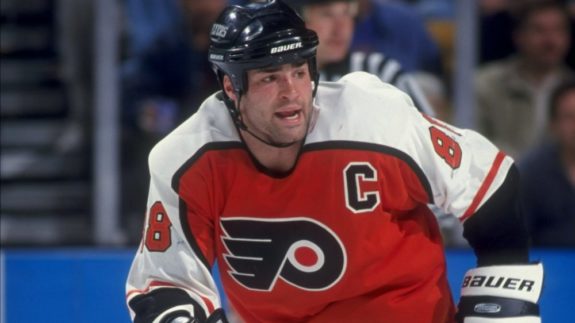
During Game 4, with Detroit leading the series 3-0, Eric Lindros finally scored his first goal of the series with 14 seconds left, but it wasn’t enough. Yzerman, the Red Wings and the city of Detroit had finally seen their dreams come true. The Red Wings were the 1997 Stanley Cup Champions!
Yzerman’s Cup Win
Yzerman met NHL commissioner Gary Bettman at center ice to receive the trophy he had been dreaming about since he was a young kid playing hockey in Ottawa. When he turned to share the Cup with the team, his teammates stayed back and told him to take a victory lap on his own. He had been the one that spent 14 years with this franchise. He had been the one to shoulder much of the responsibility for the heart breaks in previous years and he had earned his time. The team felt they could wait just a few more minutes to share in the victory. Yzerman’s dream had finally come true. He was a Stanley Cup champion.
Unfortunately, the celebration would last less than a week. A limousine carrying Slava Fetisov and Vladimir Konstantinov, two important defensemen from the Red Wings, crashed into a tree. Fetisov would escape without serious injuries, however, Konstantinov would remain in critical condition for some time, resulting in paralysis. His hockey career was over.
During the 1997-98 season, the Red Wings were on a mission to keep the Cup for their injured teammates. During a winter break in the season, Yzerman would once again play for Team Canada, this time in the Olympics in Nagano, Japan. Canada would lose to The Czech Republic in the semi-finals, but this only made Yzerman hungrier once the NHL season resumed. The Red Wings would finish second to the Dallas Stars with a record of 44-23-15 and beat the Phoenix Coyotes, St. Louis Blues and finally the Dallas Stars to secure a second straight Stanley Cup finals appearance, this time against the Washington Capitals. This one wouldn’t be much more competitive than the last, and the Red Wings would once again sweep their opponent and successfully keep the Cup.
Yzerman would win the Conn Smythe Trophy as the Most Valuable Player in the playoffs, scoring 24 points. When the Cup was presented to Yzerman at center ice, the first thing he did was bring it to Konstantinov who was on the ice celebrating with his teammates and friends. The team, and its captain, had accomplished their goal of keeping the Cup for Konstantinov.
The next several years would see playoff frustrations haunt Yzerman and the Red Wings, although Yzerman would see some more personal accolades winning the Frank J. Selke Trophy in 2000, awarded to the league’s best defensive forward.
Yzerman would get one more shot at the cup in 2002. If you were one of the few that still didn’t respect and understand what made Yzerman “The Captain”, this was the year that you were convinced. Yzerman turned in one of the most amazing seasons by any player in NHL history. Yzerman, almost literally playing on one leg due to injury, led Canada to its first Olympic gold medal in 50 years and then led the Wings to their 3rd Stanley Cup championship in five years.
Yzerman’s Final Years in Hockey
Yzerman would go on to play a few more years in the NHL, no longer the offensive superstar he once was, but a complete player and a leader grooming the next generation of Red Wings stars like Henrik Zetterberg and Pavel Datsyuk. He would win the Bill Masterson Trophy in 2003, awarded annually to the player who best exemplifies the qualities of perseverance, sportsmanship, and dedication to ice hockey, and the Lester Patrick Trophy in 2006, an award that honors the recipient’s contribution to ice hockey in the United States.
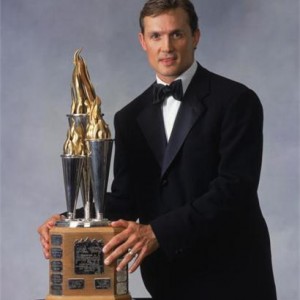
He finished his career with 1,755 points (7th in NHL history) in 1,514 games (21st in NHL history). As Yzerman always said, however, he didn’t care about his personal stats. He cared about being a great leader, being a complete player and the team’s success. On September 25, 2006, the Red Wings named Yzerman a team vice president and alternate governor. Yzerman is also now serving as General Manager of the Canadian Men’s National Team.
On January 2, 2007, the Red Wings retired Yzerman’s jersey number, 19. Former teammate Vladimir Konstantinov attended the ceremony, walking across the ice for the first time without a wheelchair since his last game in the 1997 Stanley Cup Playoffs.
In April 2019, the Red Wings named him general manager.
As an additional honor the captain’s “C” was added to the corner of his banner to forever commemorate him as “The Captain”.
Yzerman Fun Facts
Did you know?
- The first two picks in the draft the year Yzerman was picked were Brian Lawton, picked by the Minnesota North Stars (483 games 266 points) and Sylvain Turgeon, picked by the Hartford Whalers (669 games 495 points). Think either of those teams would like that draft back????
- During the 1988-89 season, Yzerman recorded 155 points (65 goals/90 assists), a total that only Gretzky and Lemieux have surpassed.
- One of only 4 players to score 150+ points in the history of the NHL (Gretzky, Lemieux, Phil Esposito)
- He is the longest running team captain in NHL History (19 years) and in North American professional sports history.
- Was named a first-team All-Star, surprisingly, only once in his career, 2000 (I guess that happens when you play at the same time as arguably the two greatest players in the history of the game)
- Had his #19 retired, not only by the Red Wings, but by the Canadian Men’s National Team
- The Nepean Sportsplex named one of its indoor ice surfaces the Steve Yzerman Arena in 1997 in his honour. This is the home rink of the CJHL’s Nepean Raiders, the Tier II Junior “A” team Yzerman played on during the 1980-81 season. The Raiders currently play in the Yzerman Division
- Steve Yzerman is a member of the Ottawa Sports Hall of Fame, Michigan Sports Hall of Fame and the Canada Sports Hall of Fame. He will also, without a doubt, be a member of the Hockey Hall of Fame upon eligibility (which of course he was!).
This article was originally published in February 2009.


Great!
Read twice. Stevie Y. The greatest captain ever!